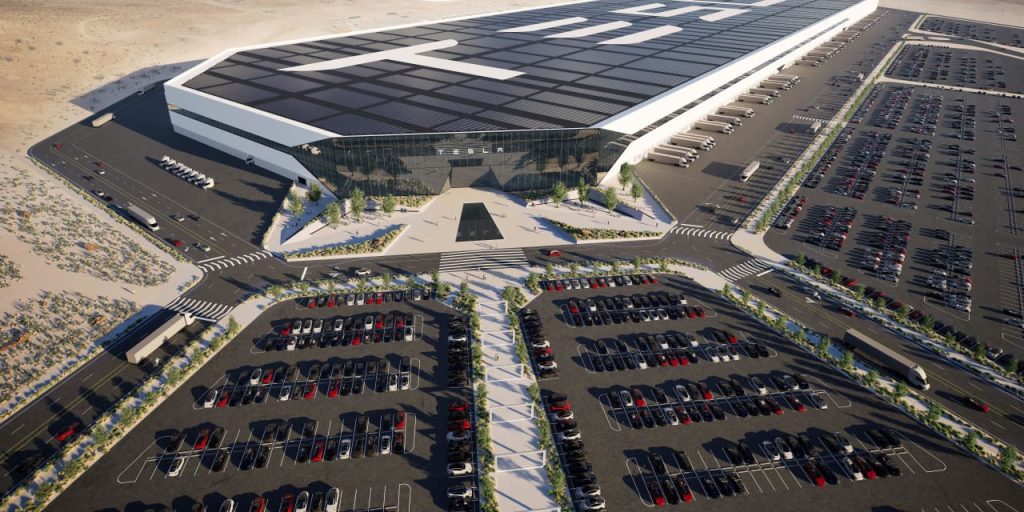Tesla
stock had a dreadful week after posting disappointing earnings. RBC’s Tom Narayan thinks investors are missing something important that will generate billions in value down the road.
Results, and the earnings conference call, catalyzed the week’s drop.
Tesla
(ticker: TSLA) posted third-quarter operating profit margins of 7.6%. Wall Street was looking for closer to 9%. After numbers were released on Wednesday evening, CEO Elon Musk sounded downbeat, lamenting high interest rates and their impact on the economy, car pricing, and car demand.
Investors were unpleasantly surprised. Shares of the electric vehicle leader dropped about $39 apiece, or almost 16%, this past week closing just under $212.
“Investors [are] missing the forest for the trees,” wrote Narayan in a Thursday report following earnings. He isn’t saying that because investors are too focused on current economic headwinds that are impacting all car companies.
“Investors will likely focus their attention on the cautious commentary on 2024 and on the potential delay of the Next Gen product,” added the analyst. “But we suspect this could be all part of a master pivot from being a volume car maker to becoming a Tier 1 supplier to OEMs.”
OEM is short for original equipment manufacturer. It’s industry jargon for auto makers. Tier 1 refers to suppliers that sell parts directly to OEMs. Tier 2 suppliers, for instance, supply parts to the Tier 1 suppliers.
Narayan thinks Tesla can become an auto parts company. “We think selling power electronics, batteries, charging, and ultimately FSD [driver assistance software], could be far more profitable.”
It’s an interesting idea. There is one problem. Parts company values and profitability aren’t really comparable to Tesla.
The total market capitalization of auto parts companies in the
Russell 3000
is about $90 billion. The largest is
Aptiv
(APTV) with a market capitalization of about $26 billion. Total sales over the coming 12 months are expected to be about $136 billion and operating profit is about $9 billion. That works out to a margin of about 6.5%.
The market capitalization for U.S. auto makers is about $800 billion. Sales expected for the coming 12 months is about $470 billion and operating profit is about $28 billion. That margin works out to about 6%.
Tesla could sell EV-related parts, but the structure of the industry doesn’t appear to mean that’s a path to billions in additional market capitalization.
Musk, in one respect, explains why. “First approximation, if you’ve got a $40,000 car and roughly 10,000 items in that car, that means each thing on average costs $4,” said Musk on Wednesday’s call. “So in order to get the cost down, say, by 10%, you have to get $0.40 out of each part on average. It is a game of pennies.”
The parts business is just as tough, or tougher, than the car-making business.
There is the idea of FSD, short for Full Self Driving. Musk has talked about licensing the software to other auto makers. He has also talked about the increase in value from having cars that truly drive themselves. That could enable fleets of robotaxis collecting taxi-like revenue around the globe without the cost of a driver.
Investors, to some extent, understand that potential. Tesla accounts for about 85% of the $800 billion market cap of the U.S. auto makers.
Narayan rates Tesla stock Buy. He has a $301 price target for the shares. That values Tesla for just under $1 trillion and almost $300 billion more than recent levels.
Overall, about 42% of analysts covering the stock rate the shares a Buy. The average Buy-rating ratio for stocks in the
S&P 500
is about 55%. The average analyst price target is about $243 a share, or about $775 billion.
Coming into Monday trading, Tesla stock was flat over the past 12 months. The S&P 500 and
Nasdaq Composite
were up 11% and 19%, respectively.
Write to Al Root at allen.root@dowjones.com
Read the full article here
